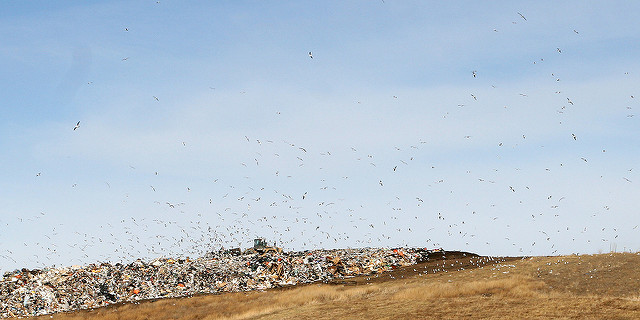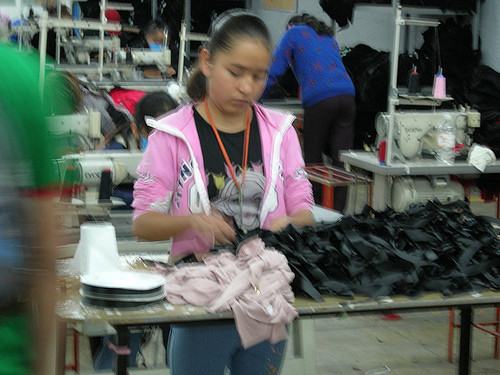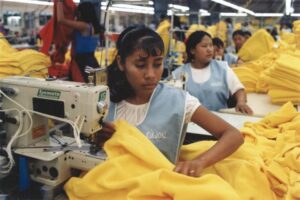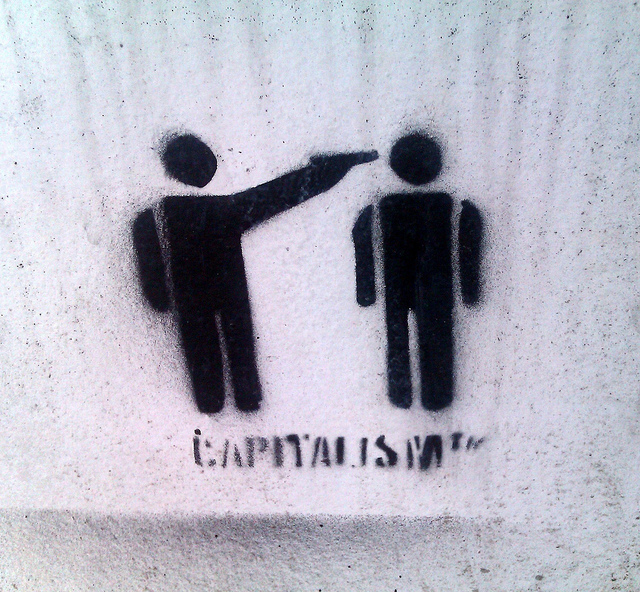Fast Fashion: Unsustainable, Racist, NOT Cute

Posted by Erica Gonzalez
February 28, 2019

I want to stress that all responsibility for climate change should be placed on corporations- not the consumer. This article’s goal is to inform the consumer. Though I believe each person should be conscientious of what/how much they consume and where it comes from, major change will only come when companies are held accountable for their heinous acts.
The fashion industry has become one of the top contributors to climate change and continuing the cycle of poverty in countries across the world. Fast fashion is the epitome environmental racism. Fast fashion are clothes that are made with cheap materials because it is meant to be sold dirt cheap and thrown away to make room for the next trend. Forever 21, GAP, H&M, Zara, Walmart, and literally almost every other store you are buying from are exploiting people of color because their line relies on subcontracting and outsourcing. They subcontract and outsource product so they can technically blame another party for the conditions that workers are forced to deal with.
For each garment that is made, the garment maker usually reaps no more than 1% of the garments’ worth. The owners of these corporations are rich and we have to demand better of them for our brothers and sisters. The owner of H&M is the 28th richest person in the world. The co-founder of Zara is the 4th richest person in the world. These greedy men can do better. They contribute to a humanitarian crisis

In countries like Bangladesh, workers are sometimes paid less than $1 an hour. Countries purposefully keep the minimum wage so low so that it peaks the interest of foreign investors (companies that want to take advantage of cheap workers to make quick profit). They only adds to the cycle of poverty, abuse against children and women, and waste. In addition to this grossly low pay, workers are left in unsafe conditions. Many factories do not follow safety standards and child labor is normalized in these countries. Violence against women (sexual, verbal, physical) is also the norm since 95% of garments workers are women while men are usually those in charge. This machismo hierarchy enforces this backwards cycle. In 2013, 1,133 workers were kills in a sweatshop factory in Dhaka, Bangladesh when it collapsed. It was described as a “ticking death chamber”.. The brands sourcing from this factory were: Benetton (Italy), Bon Marche (UK), Cato Fashions (USA), The Children’s Place (USA), El Corte Ingles (Spain), Joe Fresh (Loblaws, Canada), Kik (Germany), Mango (Spain), Matalan (UK), Primark (UK/Ireland) and Texman (Denmark). Incidents like this are not rare. Bottom line is, fast fashion is the biggest way to support the vicious, merciless, patriarchal, capitalist purge targeted at poor people of color.

Another issue with the production and consumption of throw-away clothing is that it is filling our dumps across the world. Although you donated your clothes to a local shelter or thrift store, only about 20% of the product received is actually moved on to the floor and sold. The rest is usually taken to landfills and sometimes it is flown to countries across the world. If you and I don’t want to wear this clothes, why would anyone else? Most of the clothes that makes it to these other countries also end up in the dump. When materials like cotton, linen, silk, or semi-synthetic fiber, rayon, Tencel, and modal are taken to a landfill, they degrade like other organic materials and create methane gas.
If nanotechnologists are creating shirts that don’t need to be washed for 30 days at a time, the technology exists in order to reprocess clothes. Research needs to be done to create a closed-loop industry in order not to waste more resources. No more fabrics need to be created. An ungodly amount fresh water is used everyday to dye clothes that are then treated with harsh chemicals. This dirty water is then sometimes dumped back into fresh water systems- creating more environmental destruction. However, young people are making a difference in this industry. 60% of young people are more likely to try a new brand if is eco- conscientious. We can make a big dent in this industry, environment, and in the lives of the people this effects the most. Let us show companies and our government that we value people, quality, and sustainability.

Thrifting has become more popular over recent years which helps to combat against these companies. Most thrift stores donate a lot of their extra clothes to shelters, and many profit great organizations. Many do not and try to make it seem like that. In a capitalist society like ours, it is important that we give our money to people that deserve or need it. Goodwill is “what’s up” for many resellers and young people dipping their feet in thrifting. They boast that they put over 6 million people to work and proudly hire folks with disabilities. Though they hire people with disabilities, they exploits them and have been accused of paying people with disabilities as little as half of the minimum wage-degrading. The CEO made $729,000 last year. Goodwill is an evil for-profit company that literally receives all of its product for free from the public. Donate that ⅔ of your closet to an actual organization that does something for you community. The Salvation Army is another company that is generally thought to be a good store to trust. They have been accused of enforcing and citing anti gay policies literally used to turn away LGBTQ folk from being housed. They do provide shelter for millions across the country and now “proudly serve LGBTQ” folk, but refuse to acknowledge their anti-gay past. Shop locally or from resellers online. Do clothing swaps with friends and by versatile pieces to limit consumption.

I work at the Buffalo Exchange Outlet in San Antonio, Texas. At our store, we receive all of the clothes that doesn’t sell at the East-Coast stores. We get a lot of clothing. Seeing the quality of garments and the quantity that ends up being donated is astounding. It constantly makes me reflect on sustainability of this clothing and on the materialistic value we hold in our society. We get resellers that come in daily to watch us put clothes on the rack. They literally follow us from our stations to the racks, nearly pushing us aside to get that brand shirt. It has grosses me out how much people a tag means to people. As Macklemore declared in the American Classic, “Thrift Shop”:
“I hit the party and they stop in that motherfucker
They be like, “Oh, that Gucci? That’s hella tight”
I’m like, “Yo, that’s 50 dollars for a t-shirt.”
Limited edition, let’s do some simple addition
50 dollars for a t-shirt, that’s just some ignorant bitch shit
I call that getting-swindled-and-pimped shit
I call that getting tricked by business
That shirt’s hella dough
And having the same one as six other people in this club is a hella don’t.”

Fast fashion isn’t even cool. Fashion is an outlet for expression. Are you really the same as six other people in this club? As a consumer- if you must buy new, you should check out any Fair Trade certified companies or get something that will last. Patagonia is an awesome brand that is long-lasting with service like no other company. They have a mobile repair shop in which you can get a used garment to repair yourself there to keep. They will also repair any of your gear for free. They are ethical, environmental advocates I respect more each time I learn more about them. Find your Patagonia (I can’t afford it, but I thrift it whenever I can). I urge your to give a shit and play the capitalist game. Our Queen, Marie Kondo, has spoken. We don’t need any more SHIT!!

Leave a Reply
You must be logged in to post a comment.

